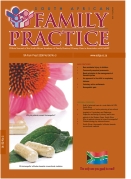Subjective Well-being of Primary Health Care Patients in the Western Cape, South Africa
Keywords:
Satisfaction with life, coping strategies, social support, quality of life
Abstract
Background: Patients living with a chronic illness face many challenges in their lives such as an altered body image, physical pain or discomfort, the need for frequent medical visits and the negative side effects of treatment. To this extent their sense of personal or subjective well-being may be compromised by the severity and chronicity of their illness. The aim of the present study was to explore the level of subjective well-being and its relationship with coping, quality of life and support from family and friends among a sample of Black South Africans attending semi-rural public clinics for treatment for hypertension and diabetes. This study was part of a larger project on treatment adherence to medication among patients living with these conditions. Methods: A convenience sample of 117 patients aged between 22 and 82 years (M=52.36, SD=13.24), receiving treatment for hypertension (n=79) or diabetes (n=24) at three primary health care clinics in the Boland area of the Western Cape were asked to participate in this study. Of the total sample, 14 (12%) were diagnosed with both conditions. Participants were asked to complete a questionnaire battery consisting of the Satisfaction with Life Scale, the Coping Strategy Indicator, the Functioning Assessment of Non-Life Treatening Conditions and the Perceived Social Support Scale. Results: The mean score of the Satisfaction with Life Scale was 28.70, which was significantly higher than those of other studies using this measure. In order to address the problem of experiment-wise error, commonly associated with the use of multiple statistical comparisons, we used the Bonferronni correction in arriving at probability levels in determining statistical significance. On average the sample as a whole appeared to be largely satisfied. The mean scores on the two of the subscales of the Coping Strategy Indicator were significantly different from those obtained from other South African samples. On the Functioning Assessment of Non-Life Treatening Conditions, the mean scores on the subscales but not the total score was significantly higher than other South African samples. Conclusions: In general, participants scored significantly higher on all of the measuring instruments compared with other South African samples, indicating high levels of life satisfaction, coping, and support from others. We found no relationship between life satisfaction and gender. Age however correlated positively with satisfaction with Life, Support from family, social and emotional well being and Quality of Life, which concurs with the findings of previous studies. Contrary to other studies we found a significant negative correlation between education and SWLS but no relationship between employment and SWLS. Our sample also reported higher levels of support from friends and family that were significantly higher than those of other South African samples. The mean scores on all the subscales of the Coping Strategy Indicator were higher than that of other South African samples. We were surprised to find that members of the sample reported high levels of life satisfaction. It is possible that that social desirability may have influenced results in an upward direction. We were similarly surprised to find a negative correlation between educational level and SWL, which requires further exploration. The participants in the present study were happier than other South African samples although they came from a disadvantage community and only 28% were employed. It has been noted that communities whose basic needs have been met evidence greater satisfaction with life. Thus greater access to basic needs such as water, electricity, and primary health care, which are characteristic of post-apartheid South Africa, may in part explain this high level of life satisfaction.
Published
2008-03-26
Section
Original Research
By submitting manuscripts to SAFP, authors of original articles are assigning copyright to the South African Academy of Family Physicians. Copyright of review articles are assigned to the Publisher, Medpharm Publications (Pty) Ltd, unless otherwise specified. Authors may use their own work after publication without written permission, provided they acknowledge the original source. Individuals and academic institutions may freely copy and distribute articles published in SAFP for educational and research purposes without obtaining permission.

